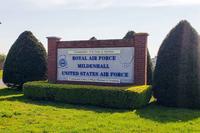The opinions expressed in this op-ed are those of the author and do not necessarily reflect the views of Military.com. If you would like to submit your own commentary, please send your article to opinions@military.com for consideration.
Dr. Steven L. Lieberman, M.D., is the deputy under secretary for health, performing the delegable duties of the under secretary for health, Veterans Health Administration.
Over the last two years, our nation's health care system has faced unprecedented challenges. From personal protective equipment shortages and bed capacity limits to employee burnout, we have all needed to be resilient and flexible to respond, save lives and protect our patients and staff.
The pandemic has been particularly challenging for veterans. Because of age, medical comorbidities and other factors, many veterans are particularly vulnerable to hospitalizations and death from COVID-19. This is challenging for the Veterans Health Administration and our more than 380,000 employees. The VHA is the largest integrated health care system in the U.S., with about 9 million veterans enrolled in Department of Veterans Affairs health care at 171 medical centers and more than 1,200 outpatient care sites nationwide.
In addition, the VHA serves as the safety net to the nation's health care system in times of public health emergencies, such as during a pandemic. Thousands of our health care workers have bravely volunteered to provide care at VA and non-VA health care facilities during coronavirus surges across the country.
The VHA is designed to be a leader in quality health care and innovative biomedical solutions, responding quickly and creatively to new challenges in the health care environment. Yet our most important asset is our employees, who provide veterans with timely access to the world-class health care they deserve.
Time and again, I have witnessed VHA employees overcome significant challenges in serving America's veterans. During the pandemic, they didn't weaken or slow down. Instead, they got stronger and found more efficient ways to care for veterans when they needed it most. Because the VA is an integrated health care system, employees were mourning the deaths of veteran patients they may have worked with for decades. While mourning the loss of patients along with colleagues, family members and friends, they often had to cover for co-workers who were exposed or sick and unable to work, meaning longer hours and later nights.
This resilience is not the exception among VHA employees; it is the rule.
Due to the extraordinary demand for front-line workers, salaries and incentives have grown to historic highs in the private health care sector. But they remain the same at the VHA due to laws that put a cap on how much we can pay our outstanding employees. Even with our high workforce retention rate of 90%, we must do better. We need to invest and care for the people who care for our nation's veterans. The time to act is now or we will face serious staffing challenges in the near future.
As the country's largest employer of health care workers, investing in our employees is one of the best ways to advance the health and well-being of veterans and the nation. Thanks to efforts by the White House that raised the minimum federal wage to $15 an hour, salaries have increased for housekeeping aides, food service workers and many others who make the VA run.
We need to keep going, which is why we are urging Congress to pass the RAISE Act and other legislation that will allow us to pay our medical staff, doctors and nurses their true worth. With congressional and White House support, we also are moving to waive limits on bonuses and increase retention incentives. We are creating new opportunities to advance within the VHA, expediting the hiring and onboarding processes, raising child care subsidy caps, and maximizing flexibility in work schedules and locations where possible.
In addition to our commitment to making the VHA a high-reliability organization, we are investing in our human infrastructure to foster a workplace of encouragement, diversity, fulfillment and satisfaction. The VHA's Reduce Employee Burnout and Optimize Organizational Thriving, or REBOOT, task force develops innovative recommendations for improving work conditions, promoting work-life balance and reducing burnout based upon input from our front-line workforce.
The VHA maintains the trust of our veterans (currently at over 93% for our response to COVID) because of our staff. I am inspired daily by our employees' fortitude and commitment. They have sustained the front lines of America's health care system during the most significant health challenge we have faced in the last century. Whether it is the generous work of custodial staff, the creative collaboration of our patient care teams or the spiritual guidance of our chaplains, the VA's public servants are a model of excellence.
The pandemic has strained and stressed us all. Yet these challenges have strengthened my belief in the importance of our health care professionals. Today, we have new therapeutic breakthroughs to provide care to more patients than ever before. The future of medicine holds great promise; that potential relies on a strong and empowered workforce. Investing in our employees is investing in the health of veterans and the nation. The VHA is proud to lead the way.











